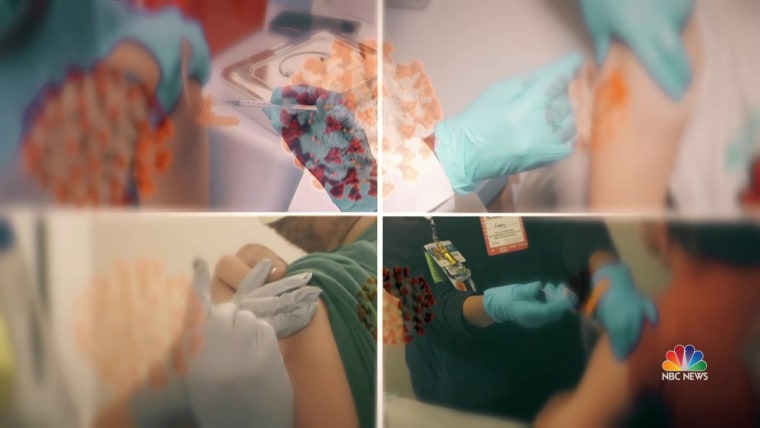In the United Kingdom, children are driving the surge in delta cases, Dr. Anthony Fauci, director of the National Institute for Allergy and Infectious Diseases, said during a White House Covid-19 briefing Tuesday. The delta variant accounts for more than 95 percent of cases in the U.K., he said.
Vaccine clinical trials for young children are ongoing in the U.S., but currently only people 12 and up are eligible to receive the shots. Though healthy kids are at much lower risk of serious illness and death from Covid-19, they can spread the virus.
“With children, the concern is transmission to others,” said Dr. Katherine Baumgarten, an infectious disease specialist at Ochsner Health in New Orleans. “This is now a preventable disease in those that can get vaccinated, so it’s important to continue to study the vaccine in children.”
Tracking delta
In Shreveport, Kamil and his colleagues regularly sequence the genomes of virus samples from across Louisiana, and around the country, to monitor how the coronavirus is mutating and to track where and how the different variants are spreading.
So far, 10 cases of the delta variant have been identified in Louisiana, but with less than 34 percent of people in the state fully vaccinated against Covid-19, and just 29.5 percent of people in Shreveport, Kamil knows that number could multiply quickly.
“All it takes is a small minority of people who aren’t vaccinated or have low enough immunity to allow the virus to spread and keep the pandemic smoldering,” he said.
Kamil knows because he’s seen it before, with a different variant known as alpha that was first identified in the United Kingdom. The alpha variant, which was previously called B.1.1.7, became the dominant strain in the U.S. in April, overtaking all others that had been circulating in the country.
Kamil and his colleagues at Louisiana State University Health Shreveport sequenced their first sample of the alpha variant in early April. Now, he estimates that more than 90 percent of the samples they sequence are alpha cases.
What we know about delta
There are several ways through which scientists can evaluate whether a newly identified variant is more contagious, whether it causes more severe disease and what kind of response it has to existing vaccines. The first part involves mining epidemiological data, which can reveal insights about the specific variant involved, the community where it was spreading, any symptoms the patient developed and whether the person was vaccinated or not.
But researchers can also drill down into the virus’ sequenced genome to identify specific mutations that are acquired as the pathogen replicates and evolves. These random mutations are often inconsequential, but occasionally some will make the virus better able to hijack human cells, thus making it more contagious, or change what the virus can do after it invades the body, potentially enabling it to cause more severe illness.
Download the NBC News app for full coverage of the coronavirus outbreak
“Every mutation buys the virus a lottery ticket. Sometimes that lottery ticket comes up with a mutation which enables it to transmit to more people,” said Bill Hanage, an associate professor of epidemiology at the Harvard T.H. Chan School of Public Health.
In early June, British Health Secretary Matt Hancock said the delta variant was thought to be 40 percent more transmissible than the alpha variant, though studies were ongoing at the time. Subsequent research from Public Health England suggested the delta variant is 60 percent more transmissible in households, compared to the alpha variant.
“As variants emerge, we are noticing that there is a difference in transmissibility as well as the potential for more dangerous outcomes,” said Dr. Alejandro Perez-Trepichio, an internist and chief medical officer for the Millennium Physician Group, which represents 550 doctors across 19 counties in Florida. “In the case of the delta variant, its transmission rate has been quoted as 40 to 60 percent higher than the previous U.K. variant, and that was in turn higher than the original one. So we’re seeing this multiplying effect.”
Based on data from the U.K., there are indications that the vaccines may be slightly less effective against the delta variant, compared to alpha and others that were previously identified. This is especially true for people who have received only one shot of a two-dose regimen.
But as was the case with the alpha variant, the available vaccines appear to offer good protection against delta in people who are fully vaccinated. An analysis released June 14 by Public Health England found that two doses of the Pfizer-BioNTech vaccine were 96 percent effective against hospitalization from the delta variant and two doses of the AstraZeneca vaccine were 92 percent effective.
“It certainly raises the stakes for vaccination,” Kamil said of the results.
And if breakthrough infections — meaning infections in fully vaccinated people — do occur, they appear to be mild. “You’ve taken something that would have been serious and turned it into something which is manageable,” Hanage said.
As the delta variant continues to take hold in the U.S., epidemiologists are paying close attention to what’s happening in Southeastern states like Alabama, Florida and Mississippi — particularly in those areas with low vaccination rates.
“It was about this time last year that the South started demonstrating to us that yes, this can transmit in the summer,” Hanage said. “It’ll be very interesting and quite valuable to see what happens.”
Follow NBC HEALTH on Twitter & Facebook.










Recent Comments